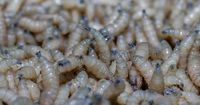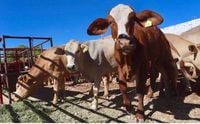In a concerning public health development, the Secretaría de Salud (SSA) of Mexico has confirmed two cases of human myiasis caused by the livestock screwworm, a parasitic infestation that has emerged in the southern state of Chiapas. The affected individuals, a 77-year-old woman from Acacoyagua and a 50-year-old man from Tuzantán, are the first reported human cases of this condition in the country, raising alarms about the potential spread of this disease.
The first case involves the elderly woman, who has a history of untreated diabetes. She suffered a fall on March 31, 2025, leading to a head trauma and a wound in the right parietal region. After experiencing fever and no improvement from home remedies, she sought medical attention on April 11 at the Hospital Rural Bienestar de Mapastepec. During her hospitalization, it was discovered that she had been in contact with livestock, including a goat and a calf that had shown signs of infestation. Surgical procedures revealed a 3x3 centimeter wound with visible larvae, confirming the diagnosis of myiasis caused by Cochliomyia hominivorax.
The second case is of a 50-year-old man who developed symptoms starting April 19, 2025, after a dog bite on his left leg. He noticed larvae emerging from the wound on April 23, accompanied by intense pain, fever, and erythema. He finally sought medical help on April 25 at the Centro de Salud de Huixtla, where six larvae were extracted, confirming the presence of the screwworm infestation.
Both cases were reported between April 15 and April 25, 2025, according to the Epidemiological Bulletin of Week 17 released by the SSA. The presence of myiasis in humans is more common in rural areas, particularly where there is close contact with infected animals. The SSA has noted that an increase in cases of animal myiasis can lead to a corresponding rise in human cases.
From November 21, 2024, to April 18, 2025, the Servicio Nacional de Sanidad, Inocuidad y Calidad Agroalimentaria (Senasica) confirmed a staggering 869 cases of livestock screwworm across Mexico, with Chiapas being the most affected state, accounting for 487 cases. Other affected states include Tabasco with 249 cases, Campeche with 116, followed by Quintana Roo and Yucatán with 13 and four cases, respectively.
The livestock screwworm is notorious for causing significant economic losses in the agricultural sector. This parasite was declared eradicated in Mexico in 1991, but recent outbreaks have been traced back to Panama, which declared a zoosanitary emergency on July 5, 2023. Subsequent cases have emerged in Costa Rica, Nicaragua, and now Mexico, prompting urgent public health measures.
Health authorities are urging residents in rural areas to remain vigilant and take preventive measures to avoid contact with infected animals. Recommended precautions include maintaining good hygiene, avoiding contact with animals showing signs of infestation, and seeking immediate medical attention for any suspicious wounds. Symptoms of myiasis in humans can include fever, localized pain, pus discharge, and visible larvae in the wound.
The SSA has also emphasized the importance of immediate reporting of any suspected cases to facilitate timely intervention and control measures. Efforts are in place to strengthen surveillance and control measures within the livestock sector to prevent further spread of the screwworm.
As the situation develops, health officials are closely monitoring the outbreak and reinforcing educational campaigns to inform the public about the risks associated with the livestock screwworm and the importance of early detection and treatment. The return of this parasite serves as a stark reminder of the interconnectedness of animal and human health, particularly in regions where livestock farming is prevalent.
The emergence of these cases has sparked concern among public health experts and local authorities, emphasizing the need for continued vigilance and proactive measures to safeguard both human and animal health in Mexico.



